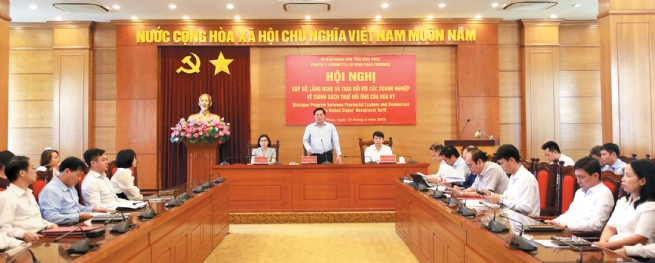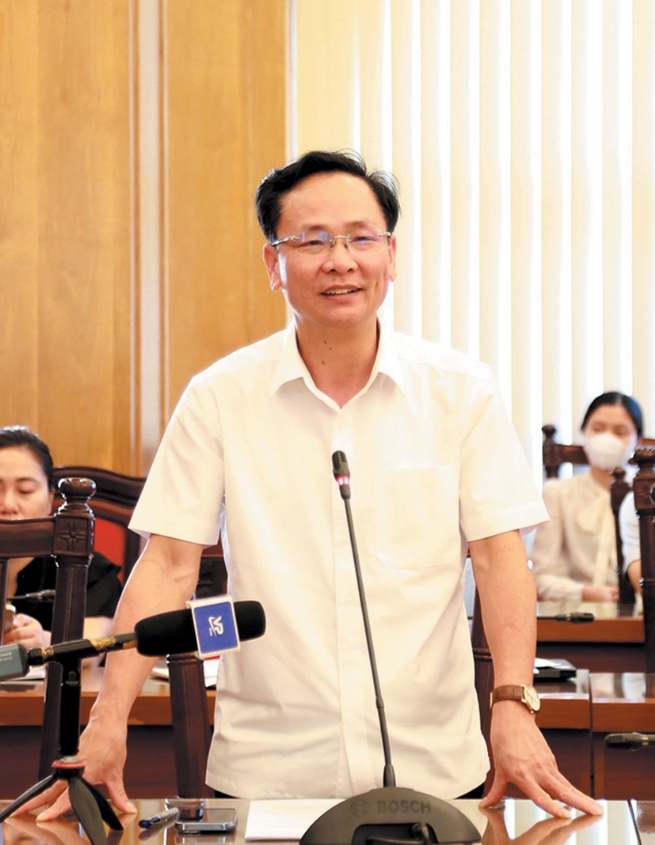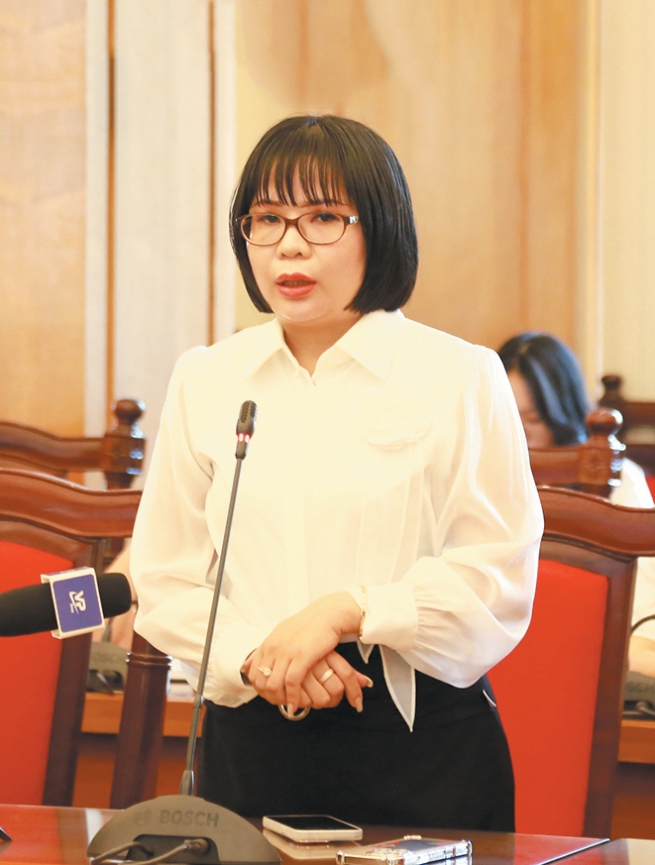Vinh Phuc province recently held a meeting on U.S. reciprocal tariffs with the business community, chaired by Mr. Tran Duy Dong, Chairman of the Provincial People's Committee, and attended by local leaders and representatives from nearly 50 exporters to the U.S. market.

Chairman of the Provincial People's Committee Tran Duy Dong chairs the meeting with the business community to address U.S. reciprocal tariffs
In 2024, the export value to the U.S. market via Vinh Phuc’s customs reached US$547.1 million, accounting for 3.1% of the province's total export value. The amount was US$125.6 million in the first quarter of 2025, accounting for 3.6% of the province's total export turnover.
Key exports included motorcycle components, apparels, helmets, footwear, household appliances and electronic components.
 |
According to the Provincial Department of Finance, when the 46% reciprocal tariff is enforced, it will increase the cost of products from Vietnam, and from Vinh Phuc in particular, in the U.S. market, thus weakening their competitiveness relative to goods from other countries, resulting in an export contraction.
In addition, the high reciprocal tariff of the United States makes Vietnam’s investment environment, including Vinh Phuc, less attractive, negatively impacting industrial production and employment. According to a survey from the Vinh Phuc Industrial Zones Management Board, the province has 45 companies directly hit by that tariff policy and 49 enterprises indirectly affected.
At the conference, business representatives assessed the impact of the new U.S. reciprocal tariff policy on their operations; discussed and shared short-term and long-term response solutions; and proposed solutions to central and provincial governments to ensure stable business operations.
The provincial government affirmed that they would provide maximum support to companies to tackle hardships. In particular, the Vinh Phuc’s customs sector is ready to closely coordinate with the business community, promptly resolve import and export obstacles and tax policies, and ensure the transparency of issuing certificates of origin.
Tran Duy Dong said that countries and territories, including Vietnam, are currently promoting negotiations on tariff issues with the United States.
While waiting for negotiation results, he requested agencies and localities to stick to the highest goal and strive for double-digit growth in 2025.
 |
He requested relevant agencies and localities to provide advice on the consistent, flexible and effective implementation of macro policies, especially monetary, fiscal, trade, investment and other policies, to support the economy, businesses and investors; proactively figure out difficulties, obstacles and barriers that directly impact the province’s economic development process as well as enterprises’ business operations.
At the same time, agencies and localities will strongly develop the domestic market by bolstering distribution through digital platforms and e-commerce platforms and adopting solutions to stimulate consumption and promote trade.
They will implement investment promotion programs and plans and competitiveness improvement plans more effectively and substantially while focusing on reducing administrative procedures and building a high-quality, capable workforce.
They will ensure adequate power and water supply for production; invest in upgrading and completing transport infrastructure and logistics infrastructure to slash production costs for companies, attract new investors and retain existing investors in the province.

Vinh Phuc province is committed to supporting businesses and removing obstacles to their development
Tran Duy Dong suggested that businesses and investors need to trust in the leadership and diplomacy of Party and State leaders, stay calm, maintain their courage and intelligence, respond to new developments in an active, creative, flexible and prompt manner, and firmly grasp situations to have appropriate and effective responses. They should advocate for a shift in trade policy, from high import duties on inputs to higher tariffs on finished products, to enhance domestic production competitiveness.
They need to strengthen trade defense capacity while strongly switching to FOB-based production so that customers can share taxes; actively negotiate with importers to share tax burdens, clarify the origin of goods, build a clear process for managing the origin of inputs, and avoid input overdependence on a few countries. They should diversify export markets, seek alternative markets, expand product distribution through e-commerce platforms, improve production processes, proactively advance digital transformation, strongly apply scientific and technological achievements, and reinforce domestic supply chains.
He hoped that businesses will continue to share their views frankly, make recommendations and give timely advice, ensuring that benefits are balanced and risks are shared. Vinh Phuc province is committed to supporting companies and removing obstacles for them.
By Hien Hung, Vietnam Business Forum